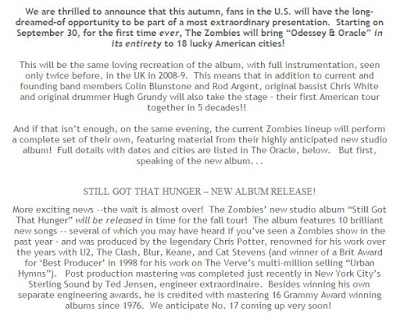Backdated, archival post
[
link to original on tumblr]
---&---
Yester-day I listened to Colin Blunstone's
Journey, and this morning I listened to
The Ghost of You and Me. Here's some stuff I noticed:
"Weak for You"
One of the lines in "Weak for You" is "It may sound Greek to you," which refers to the common saying ("It's Greek to me") for something that's incomprehensible. That expression comes from Shakespeare's
Julius Caesar (I.ii.286). My CD copy of the album doesn't have any credits, but
according to Wikipedia, "Weak for You" was written by Pete Wingfield (who apparently also played keyboards on some of Blunstone's solo albums). So it's interesting that even though it wasn't written by Argent or White, there's still a Shakespearean connection like Argent's quotation of
The Tempest in the
Odessey and Oracle liner notes or White's "brief candles" (from
Macbeth, albeit via Huxley).
I also noticed that the "falling" in "I feel myself falling" is accompanied by a descending melody.
"Smooth Operation"
In the bridge, there're the lines "We two got along / Like an A with middle C / Simple harmony." An A with a C forms the interval of a minor third, and since minor intervals are often perceived as sad, it seems as if the two don't get along that well.
"Any Other Way"
This mentions "a rain summer's day," which seems to have some connection with the first line of "Beechwood Park" - "Do you remember summer days just after summer rain." Rainy summer days seem to be the normal weather for Zombie songs.
"Now I Know I'll Never Get over You"
In "Now I Know I'll Never Get over You" I found (what I think are) some references to earlier Zombie songs.
Two years ago, I noticed that the line "It's alright if the words won't come" mirrors "but the words won't come" in "I Love You." This morning I noticed "Seasons come and go / But this feeling never changes," which seems to be a very slight
Odessey and Oracle reference (naming "Time of the Season" and "Changes"). There's also "We can work it out," which seems to be a more optimistic spin on "If It Don't Work Out." Actually, there might be a Beatle connection behind that too.
Of those four, I think "I Love You" is the most likely to have been intentional. The others are probably just coincidences.
"Love Left a Long Time Ago"
"Love Left a Long Time Ago" references (indirectly at least) "You Always Hurt the One You Love," which is a song from - I think - the '40s. Apparently it's a standard, but I'm most familiar with the Mills Brothers' version, which is from 1944. "Love Left a Long Time Ago" has the lines "Why do we always hurt the ones we love / The ones we shouldn't really hurt at all," which differs only slightly from "You always hurt the one you love / The one you shouldn't hurt at all."
"The Sun Will Rise Again"
At the end, there are rising figures in each of the instruments to reflect the titular line.

